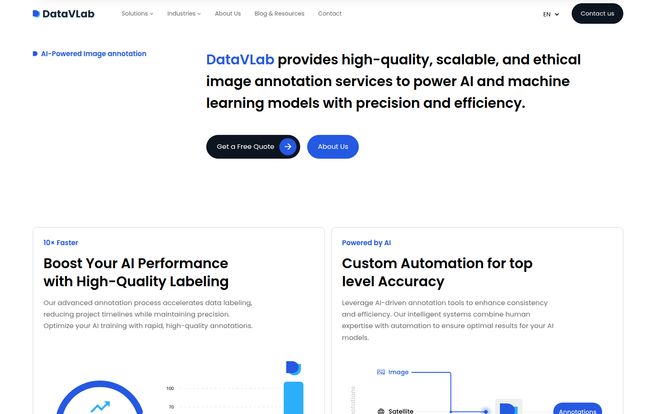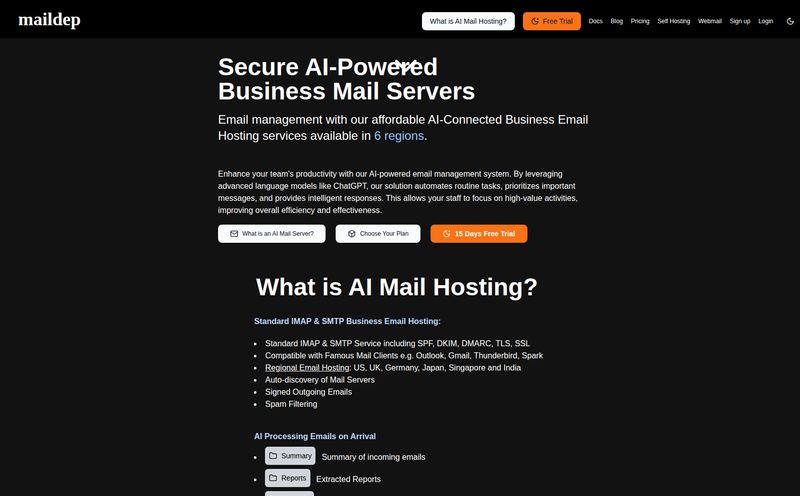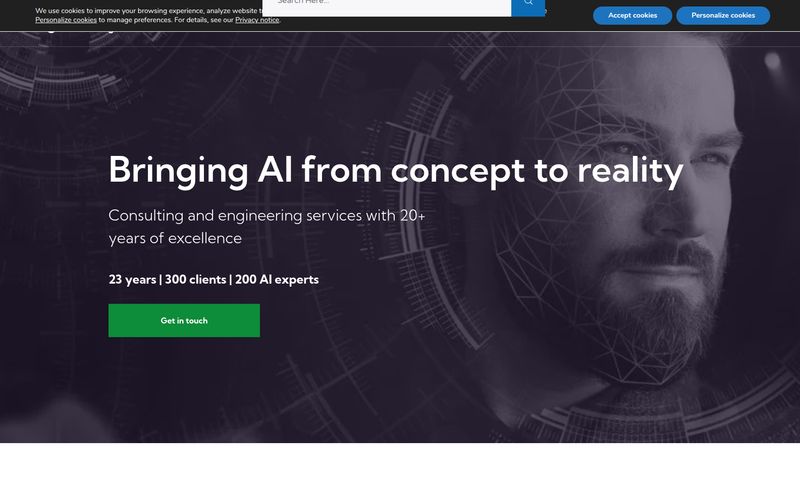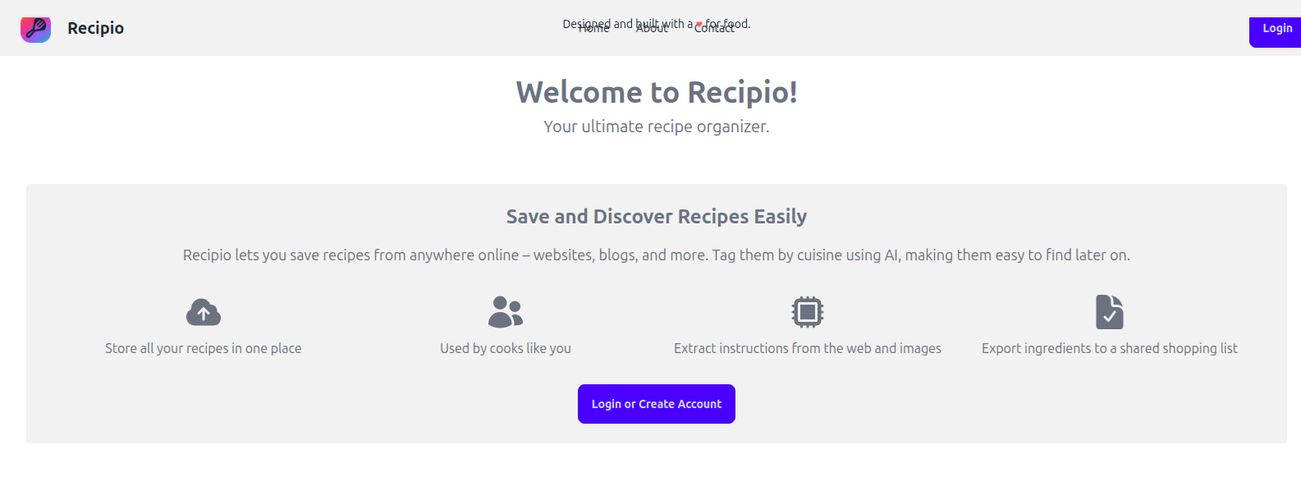Let me tell you a story. A few years back, I was consulting on a project for an e-commerce startup. They had this brilliant idea for an AI-powered visual search tool. The dream? You snap a photo of a chair you like at a friend's house, and their app instantly shows you similar chairs you can buy. The problem? They fed their shiny new algorithm a mountain of poorly labeled images. Chairs were tagged as tables, lamps as vases... you get the picture. The whole thing collapsed. Millions in funding, down the drain. All because of bad data.
That experience was a painful, expensive lesson in a truth I now consider gospel: Your AI model is only as smart as the data it learns from. It’s the GIGO principle—Garbage In, Garbage Out—and in the AI gold rush, it's the single biggest reason most prospectors come home empty-handed.
Which brings me to platforms like DataVLab. I’ve been keeping an eye on them for a while. They’re in the business of providing the foundational stuff, the clean, well-organized, accurately labeled data that prevents AI disasters. But are they any good? Let's get into it.

Visit DataVLab
So, What's the Deal with DataVLab?
At its core, DataVLab is a high-end data annotation service. Think of them as the master chefs for your AI's diet. You bring them raw ingredients—your terabytes of images, videos, text, or 3D scans—and they meticulously prep, chop, and label everything so your model can digest it properly and learn effectively.
They offer a whole suite of services, from the bread-and-butter image annotation (drawing boxes around cats) to complex 3D semantic segmentation for autonomous vehicles and even solutions for the new wave of Generative AI and LLMs. They're not just a tool; they position themselves as a scalable human-in-the-loop partner for serious AI development.
Why You Should Obsess Over Data Quality
I can't stress this enough. We all get excited about fancy algorithms and massive neural networks, but none of that matters without a rock-solid data foundation. It’s like building a skyscraper on quicksand. You can have the most brilliant architectural plans in the world, but it’s doomed from the start.
High-quality data annotation is the difference between an AI that can reliably identify cancerous cells on a medical scan and one that... well, can’t. It’s the difference between a self-driving car that understands the difference between a pedestrian and a lamppost and one that causes a five-car pile-up. This is not a corner you want to cut.
This is the problem DataVLab is built to solve. Their whole pitch revolves around quality, accuracy, and scalability, which are the three pillars you desperately need when you move past the hobbyist stage.
The DataVLab Playbook: A Five-Step Process
I snooped around their site, and their process seems pretty straightforward and, honestly, what I’d expect from a professional outfit. They break it down into five steps:
- Project Scoping: This is the initial chat. You tell them what you need, they figure out the scope. Standard stuff.
- Scoping & Calibration: Okay, this is where the magic happens. In my experience, this is the most critical phase. This is where you align on the nitty-gritty details. What defines a 'pedestrian'? Does it include someone on a scooter? What about a person partially obscured by a tree? Getting this calibration right prevents a world of pain later.
- Annotation: The actual work begins. Their teams, assisted by AI tools for speed and consistency, get to labeling your data according to the rules you set in the calibration phase.
- Quality & Assurance: This is huge. They don't just label and ship. There's a review process to catch errors, ensure consistency, and maintain the high-accuracy promises. Any service that doesn't talk about QA isn't worth your time.
- Delivery: You get your perfectly prepped data, ready to feed the beast.
A Peek Inside the Toolbox
DataVLab isn't a one-trick pony. Their service offerings are pretty comprehensive, covering most of the bases for modern AI development.
Beyond Bounding Boxes: Image and Video Annotation
This is probably their most common service. But it’s not just about drawing simple squares. They handle everything from basic bounding boxes and polygons to pixel-perfect semantic segmentation (where every single pixel in an image is classified). This level of detail is essentail for things like medical imaging and satellite photo analysis.
Entering the Third Dimension with 3D and Custom AI
For industries like autonomous driving or robotics, 2D data isn't enough. DataVLab works with 3D data, like LiDAR point clouds, to create rich, three-dimensional training sets. This is incredibly specialized work and a good sign that they're operating at a high level of expertise.
Teaching Machines to Read: NLP and GenAI
With the explosion of models like GPT-4, the demand for high-quality text data has skyrocketed. DataVLab has jumped on this, offering Natural Language Processing (NLP) annotation and solutions for Generative AI. This could be anything from sentiment analysis to training a custom LLM on a specific domain of knowledge.
Who's This For? A Quick Tour of the Industries
A service's client list tells you a lot. DataVLab showcases a pretty impressive range of applications, from the obvious to the surprising.
- Autonomous Vehicles: A no-brainer. This is a massive consumer of labeled 2D and 3D data.
- Healthcare: Think annotating MRIs, X-rays, and pathology slides to train diagnostic AI. The stakes here are incredibly high, so quality is non-negotiable.
- Agriculture & Environment: Using aerial or satellite imagery to monitor crop health, identify diseases, or track deforestation.
- Retail & E-commerce: My old stomping grounds! This is for visual search, automated product tagging, and shelf-monitoring robots.
- Fashion & Luxury: Identifying clothing attributes, styles, and patterns from images.
The breadth here tells me they have flexible teams and are capable of developing domain-specific expertise, which is a big plus.
The Good, The Not-So-Good, and The Quote Button
Alright, no review is complete without a balanced look. So what do I really think?
The Good Stuff
There's a lot to like. Their focus on high-quality, ethically-sourced data is a huge green flag. The use of AI-assisted annotation is smart—it improves speed and consistency, which is a win-win. Their solutions are built to be scalable, meaning they can grow with you from a pilot project to a full-blown enterprise deployment. Honestly, they tick most of the boxes I'd look for in a serious data partner.
Let's Talk About Pricing... Or Not
Now for the elephant in the room: the price tag. Or, in this case, the lack of one. When I went looking for a pricing page, I hit a classic '404 Page Not Found'. A minor slip-up, it happens to the best of us, but it highlights their model. You won't find a neat little table with pricing tiers.
DataVLab operates on a quote-based system.
Is this a bad thing? Not necessarily. For complex, bespoke B2B services, it’s the industry standard. The cost depends entirely on the complexity, volume, and required accuracy of your specific project. Labeling 10,000 images with simple bounding boxes is a different beast than segmenting 500 hours of 3D LiDAR data. However, it does mean you can't quickly price-check them against a competitor. It requires a conversation, a detailed project brief, and a bit of a time investment upfront. For a small team or a startup on a shoestring budget just trying to get a rough idea, this can be a bit of a hurdle.
My Final Take: Is DataVLab Your Project's Missing Piece?
At the end of the day, it comes down to what you need. If you're a large company, a well-funded startup, or a research institution working on a mission-critical AI project where accuracy cannot be compromised, then DataVLab looks like a very strong contender. Their process, expertise, and focus on quality are exactly what you should be looking for.
If you're a hobbyist, a student, or a very early-stage founder who needs 500 images labeled on the cheap, this is probably overkill. You might be better served by a simpler, off-the-shelf platform with transparent, per-unit pricing.
DataVLab is for those who have learned the hard way—or are smart enough to learn from others' mistakes—that the success of any AI ambition rests entirely on the quality of its data foundation. They're not selling a cheap fix; they're selling peace of mind.
Frequently Asked Questions
What exactly is data annotation?
Data annotation, or data labeling, is the process of adding metadata (tags or labels) to raw data to make it understandable for machine learning models. For example, in an image of a street, you would label cars, pedestrians, traffic lights, and so on, so an AI can learn to recognize those objects.
What industries does DataVLab serve?
They cater to a wide range of industries, including autonomous vehicles, healthcare, retail, e-commerce, agriculture, satellite imagery, insurance, and fashion.
Is DataVLab a good choice for small projects or startups?
It depends. Their model is geared towards larger, more complex projects that require high accuracy and scale. While they might take on smaller projects, the quote-based pricing and need for detailed scoping might be better suited for teams with established budgets and project definitions, rather than those in the early experimental phase.
How does the AI-assisted labeling work?
AI-assisted labeling uses a 'human-in-the-loop' approach. An initial AI model makes a first pass at labeling the data (e.g., suggesting where the boxes should go). Then, a human annotator reviews, corrects, and perfects these suggestions. This makes the process much faster and more consistent than purely manual labeling.
Why doesn't DataVLab show its prices?
Many specialized B2B service providers use a quote-based model because the cost is highly variable. The price for data annotation depends on many factors: the type of data (image, video, text), the volume of data, the complexity of the labels required, and the desired accuracy level. A fixed price wouldn't accurately reflect the custom nature of the work.
Conclusion
The AI landscape is noisy and full of hype. It's easy to get distracted by the latest and greatest algorithm. But as any seasoned pro will tell you, the real, unglamorous work lies in the data. A service like DataVLab represents the serious, foundational side of AI development. By focusing on providing clean, accurate, and scalable data, they’re enabling the kind of breakthroughs that actually work in the real world. If you're building something meant to last, investing in a solid foundation isn't just a good idea—it's everything.
Reference and Sources
- DataVLab Official Website: https://datavlab.com/



